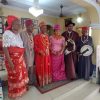An Open Paper by Oliver O. Mbamara.
A look at Nigeria's history would reveal repeated but missed opportunities for the country to move forward. The populace and the leadership are equally liable for letting such opportunities slip. No blames need be apportioned away from ourselves. If the nation must progress, we must all search our conscience and review the roles we have played as well as the roles we intend to play in the fate of the Nigerian nation. We must learn from history or be condemned to the annals of repeated failures who whine but fail to make good use of the opportunities of change.
One good thing about history is that it has a way of making the lessons of one lifetime/generation available for the helpful use of another lifetime/generation. It combs through memories of forgotten events of the past and presents them in fresh context. Incidentally, historical reminders are usually ignored or dismissed by those who have little or no regard for history even when expressly warned just like the case of prophet Jeremiah who warned his people to change their ways, or like the Soothsayer who warned Julius Caesar to "beware of the Ides of March." Most times those who ignore history realize their folly too late. Yet history would patiently record such folly and make it available yet again to the next generation/lifetime so that those who have ears would listen and hear, and those who have eyes would look and see.
In the history of Nigeria's 55 years of independence, many changes in the mantle of leadership have occurred each time raising and dashing the hopes of the populace. Either the regime comes into power riding on a popular manifesto and then abandons it over the course of time or it is toppled or subverted by another bunch of leaders who feel they are better ordained to lead the Nigerian populace. It has been the bane regardless of whether the leadership has come by way of military coup or civilian elections. Once in power the same mindset seems to prevail amongst such leaders - fill their coffers, appoint their acquaintances, settle their loyalist, haunt their opposition, disregard the plight of the populace or electorate, thrive to perpetuate their stay in power, or continue to influence the leadership (Godfatherism) even after leaving the seat of power. The electorate is not excused. People complain about the state of the nation and cry for change of the status quo, yet once new leaders emerge, the agitation for change fades away or is replaced by the yearning for appointments, settlements, and tribal or religious sympathies/sentiments. Basically, people fail to hold such emerging leaders to the words and promises upon which they emerged to grab or take the mantle of leadership.
Historically, exceptional Nigerians have sought to hold the leadership accountable although they never triumphed over the powers that be who detest any attempt to change the status quo. Such crusaders like Social Activist Tai Solarin, Human Rights Attorney Gani Fahwehmi, Police Officer Alozie Ogubuaja, Writer/Activist Ken Saro-Wiwa, Afrobeat Musician Fela Anikulapo Kuti, and Outspoken Statesman Ahmadu Abubakar, among others. These individuals were bold enough to stand for the truth and/or champion the courses of the populace and the less privileged, giving voices to their issues. Sadly, their voices echoed in isolation like that from the wilderness. They did not get the timely support of the Nigerian populace to bring enough pressure for the needed change to prevail. Though aware of the dangers involved in their agitations, some of them put their lives on the line and sadly paid the ultimate price. We bow our heads and remember them, but have we learned to hearken to such voices when we hear them again? Well, today, another voice can be heard in the person of newly elected Senator Ben Murray Bruce calling for better/responsible governance, accountability, and restrictions on the excesses of leadership.
These calls come at a very significant time in view of the expectations and the yearnings for change of the status quo which brought about the election of Muhammadu Buhari and Yemi Osinbajo into power. Many Nigerians have issues with President Buhari's past and are still calling on him to account or apologize for the atrocities that prevailed during his military rule in Nigeria. In response, he has asked not to be judged by his military days, yet from all indications he does realize that he has to do more to proof his goodwill and ability to bring the needed change within a democratic setting without resort to dictatorial decrees or high-handedness. It should not be lost on President Buhari that while 15.4 million Nigerians voted for him, another 12.8 million voted against him. Fortunately, the issues raised in the calls by Senator Bruce (PDP) for change of the status quo transcends party lines and fall in line with the values upon which President Buhari (APC) ran for election. This provides a common ground for the new administration to work together to effect the needed change regardless of party or religious affiliations. It also affords the president the opportunity to form an all embracing government of decent and capable hands regardless of affiliations.
Much as a lot is expected from the president as the official executive head of the administration, the leadership of the legislature and the judiciary in both federal and state levels must be held to high standards and constant scrutiny if the needed changes have to occur. Nigerians have to rally behind the calls by Senator Bruce to ensure that legislators selflessly focus on passing laws that really cater to the issues of the Nigerian populace, while the judiciary is held accountable to fearless and impartial interpretation of the laws. Upholding the rule of law while ensuring that no one is above the law regardless of their affiliations, and that for every crime/offence there is a consequence.
Granted, many who are benefiting from the status quo are not happy with such calls for change and would ordinarily do all they can to frustrate any such moves. Many of those elected to power spent huge sums to run and win their elections, and would afterwards come under pressure to settle their sponsors and god-fathers, ironically at the expense of the populace who actually voted them into power. There are many Nigerians who still doubt that the new administration would bring the change Nigerians expect because they are suspicious of the usual politicians and politicking at the helm of the new ruling party. Would it be just another set of politicians stepping into Aso rock to perpetuate the status quo, or is this the real deal for real change? It may be early to tell for certain, yet President Buhari has a chance to rise above Nigeria's political Godfathers and their influence on governance. It is not guaranteed but it is possible. The selection and caliber of his cabinet will be an early indication of what to expect, yet the engagement of the populace will determine the extent of success or failure in the long run.
If Nigerians truly want change, this is the time for the populace backed by the media to amplify the call to set the trend and momentum to sustain a change of the status quo or else it would soon become business as usual at the top if the likes of Senator Ben Bruce are frustrated or discouraged. As the new dispensation takes off, it would not be enough for Nigerians to simply hope and look ahead. They have to be ready and willing to do more to constantly remind those at the top that Nigerians are watching and waiting for the execution of the promises upon which they were elected. If the Nigerian populace fails to do so then they have also failed the nation and should also hold themselves accountable.
It is indeed in the interest of all Nigerians especially those at the top to heed the calls by Senator Ben Murray Bruce to work towards fixing the system. For according to the often repeated words of the late ebullient Professor Adigun, my erudite jurisprudence teacher in my days at the University of Lagos, "the rebellion of the head may be easy to quell, but the rebellion of the stomach may not be easily quelled." We need not get to that point. Let us all learn from history if we wish to get better.
***
ABOUT THE AUTHOR: Oliver Oscar Mbamara is an attorney & admin judge, an award-winning filmmaker, actor, and poet. For more on Oliver Mbamara, visit www.OliverMbamara.com
Also By Oliver - Nine Brief Points for Nation Building: An Open Paper to All Nigerians










